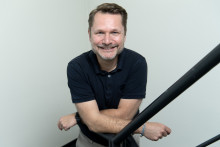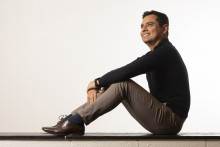benno spieker
PhD research topic: Applying interaction technology to contribute to music pedagogy training for music education in schools
Work: PhD candidate at the Human Media Interaction group at the University of Twente and at the Institute for Psycho-accoustics and Electronic Music at the University of Ghent (joint-PhD) & educator of music teachers at ArtEZ University of the Arts in Enschede
Education: Master’s degree in Musicology from Utrecht University & bachelor degree in Music in Education from ArtEZ University of the Arts in Arnhem
Originally from: the Netherlands
‘My PhD research looks into how interaction technology could support music teachers, more specifically teachers in training. In the Netherlands, music education is unfortunately not on the forefront. It is not an aspect of education that society finds important, even though we know that it has many benefits. It allows children to learn the language of music, but it also supports their social, cognitive, and emotional development, among other skills. Sadly, education in the Netherlands doesn’t focus on art education. For such a wealthy country, our art education is very poor.
Most primary schools don’t have specialized music teachers, and research has found that regular teachers don’t feel confident in teaching music. There isn’t enough time spent on music pedagogy at teachers’ academies (PABO), which is problematic because then the teachers cannot develop and pass along their music knowledge. At the Human Media Interaction (HMI) group, we think that interaction technologies could help with this and better prepare teachers for teaching music at schools.
One example of such technology is an iPad for providing feedback to the student who is practicing music pedagogy in class. At teachers’ academies, students often roleplay to practice their teaching skills. However, it can be difficult to give direct feedback during musical exercises. We are therefore testing an iPad which the classmates can use to give feedback to the colleague who is currently practicing his pedagogy skills. We are also looking into other modalities, such as practicing in a VR (virtual reality) classroom or applying hand drums that use lights to give feedback. We want to be able to measure what is happening – musically – and translate it into some meaningful feedback. However, we don’t want to provide technology that just leads to cognitive overload. Teaching music to a whole group is already a very demanding task.’
‘I’m curious. That is the main reason why I decided to do a PhD. I’m curious about how things work, and how I could give back to the world, but I’m also curious about what I’m capable of. My secondary education didn’t prepare me for an academic career, but I have proven to myself that if you want to get somewhere, there are many ways to achieve it.
‘If you want to get somewhere, there are many ways to achieve it’
I studied civil engineering at MBO level, and later on HBO level. After working on civil engineering projects for a while, I concluded that I had to do something with music. My mind was full of music, so I thought my daily work should be full of music too. On the advice of my parents, I first got a regular job, but when I was older, I decided to study music in education.
Music is something that has been driving me since I was little. I was always singing. I joined a choir in our village as soon as that was possible. I was determined to learn how to play drums. I joined several bands – and one was quite successful. We participated in the Dutch music contest ‘De Grote Prijs van Nederland’ and we won the first prize in the public vote. We played live on a TV show watched by one million viewers, and the phone didn’t stop ringing after that.’
‘Two days a week I teach at ArtEZ University of the Arts in Enschede, where I also focus on how to apply interaction technology. On top of that, I’m a music education consultant of the Dutch foundation “Méér muziek in de klas” which promotes music in primary education. That means I have about one or two days a week to spend on my PhD research. I would like to spend more time on it, but life is busy, and I currently fund my own research. Still, doing a PhD only part-time is doable for me. The research runs parallel to my other activities, it is not separate from them. I’m also in a very privileged situation. My children are teenagers, so they are quite independent, and my wife is very supportive.
I don’t put any pressure on myself in terms of time. I don’t plan to finish my PhD by the time I turn fifty years old. If it takes longer, it’s okay. When you are doing a PhD, you also need time to think and reflect. What I learn from students at the UT, I can apply at the music school and vice versa. It helps innovate the study programmes and music. And being able to innovate in music is something I really enjoy.
My situation is very different from most of my colleagues’. I essentially do PhD in my free time, and I had to come up with the research topic by myself, while other PhD candidates tend to apply for a specific project. During my Master’s in Musicology, which I finished in 2015, I did an internship in Ghent where I worked on an interactive music system. My supervisor offered me a PhD position there, but it wasn’t doable to move there with my family and for my wife to find a new job. I turned down the offer, but it stayed on my mind. In the end, my current supervisor at HMI suggested that I’d do my PhD here in collaboration with the Institute for Psycho-accoustics and Electronic Music (IPEM) at the University of Ghent, which focuses on the overlap of music and movement in the domains of sports, health, and education.
'It doesn’t come easy, but it’s definitely worth it’
It's hard work. It doesn’t come easy, but it’s definitely worth it to do a PhD. It helps me think about what I do in much more detail. And it opens up opportunities for music education. I think it’s important for children to learn to express themselves in other ways than only language. They should be able to express themselves in all the ways that make us human – dance, music, theater, painting, fashion… Creativity is so important in human life. Unlike math, there isn’t one right answer in music. Music offers all kinds of answers. It has become so normal for everyone to think very individualistically, but in music you always have to work together, negotiate, find the right rhythm and sync with each other. That is a useful skill to have.
I don’t have a plan on what will come after my PhD. I still like my job at ArtEZ, but I also really like doing research. Who knows what will come along, but it’s always good to spread your wings.’







